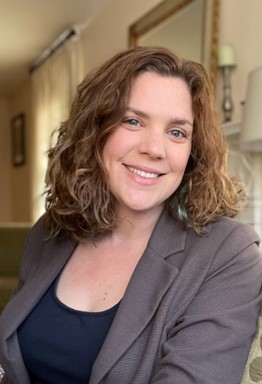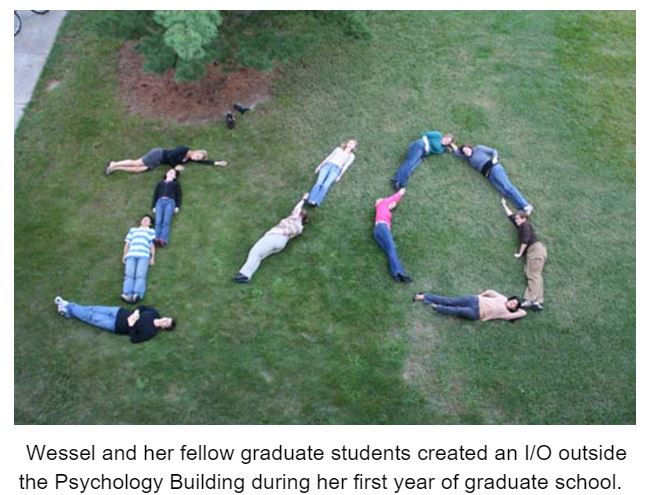Meet Organizational Psychology Alumna Dr. Jen Wessel
February 29, 2024 - Shelly DeJong
 Dr. Jen Wessel earned a Ph.D. in Psychology from Michigan State, specializing in Organizational Psychology. Now an associate professor of psychology at the University of Maryland, Dr. Wessel reflects on her time at MSU, how it impacts her work today, and what three pieces of advice she has for current graduate students.
Dr. Jen Wessel earned a Ph.D. in Psychology from Michigan State, specializing in Organizational Psychology. Now an associate professor of psychology at the University of Maryland, Dr. Wessel reflects on her time at MSU, how it impacts her work today, and what three pieces of advice she has for current graduate students.
Can you tell us about what you are up to?
I've been at the University of Maryland since 2014 and received tenure a couple years ago. We are a unique interdisciplinary program because we bring together Social Psychology, Decision Sciences, and Industrial and Organizational Psychology all into one. I look at a variety of topics and identities, but what tends to interest me is understanding the experiences of people who are marginalized or historically excluded in the workplace, and understanding ways that we can potentially improve upon the status quo.
Is that similar to what you studied at Michigan State?
My advisor Ann Marie Ryan and I worked on many different projects around diversity and inclusion in the workplace. She was an excellent mentor and research partner. We did quite a few projects that examined the experiences and treatment of women in the workplace. For one we looked at how the climate for women in male-dominated workplaces affected job satisfaction for women and men. We also conducted a laboratory study examining how women described themselves when applying for a position in a male-dominated field. We found that changing only a few words increased the likelihood that women would be seen as a good fit for the job. We conducted some other work together on sexual orientation harassment, fairness in the workplace, and other projects.
Tell us about your current projects and what you are excited about.
I'm working on a couple interdisciplinary projects that focus on neurodiversity and specifically autism in the workplace that I’m excited about. For one collaborative project, I’m working on a team of psychologists, computer scientists, and a hearing and speech scientist on examining the efficacy of a training that would help neurotypical people better understand how autistic individuals want to be treated at work. We've developed the training, but the next step will be testing the efficacy of that training.
I'm also part of a team that working on how to make STEM research labs more inclusive for autistic students. In general, autistic individuals have a much lower graduation rate than their neurotypical peers and tend to be underemployed. Scholars with disabilities are also under-represented in academic research. Yet research shows that the autistic community has many strengths that lend themselves well to STEM research, like attention to detail, for example. Our idea with this project is to understand how to develop training for STEM labs to make them more inclusive. We then aim to roll out a large-scale project at the University of Maryland where we will place autistic students into STEM labs and make sure they receive mentoring while also, very importantly, mentoring the mentors on how to be more inclusive (funding pending). We are hoping to be a model for neurodiversity inclusion in labs.
Currently, I am also leading an interdisciplinary NSF grant with two higher education researchers to examine how valued diversity and inclusion efforts are in tenure packages. A lot of faculty are being told that these efforts are important and valued in universities, but we’re looking to see if it is actually valued and seen as compensatory or viewed as a “nice to have” addition. We have some preliminary results back and have some interesting findings.
It sounds like an interdisciplinary research approach is important to you. Can you talk about that?
I think we learn more when different fields collide, discuss problems, and work on them together. You might realize that you've been studying the same thing but from slightly different angles. You can also learn new techniques. I think the science is better when we are interdisciplinary.
But my main reason for doing this work is that it's the most fun! When I first came to Maryland, I had the opportunity to work with political scientists on understanding Congress as a workplace. We interviewed former members of Congress, and we learned all this stuff. I've always loved learning new things, and I have realized that I tend to learn the most in interdisciplinary projects and collaborations.
How did your education at MSU uniquely prepare you for your career as a professor and researcher?
I had such a great experience at MSU in the graduate program. It is a special place in how it trains and prepares students. A high degree of independence is valued and instilled in you as a graduate student while still getting great mentorship. The expertise amongst the faculty helped build me up. The culture of developing one another, being open to improving, and trying to do things even when you didn’t feel quite ready was helpful for me. All the opportunities to speak in front of the faculty and my fellow students helped build my confidence as a researcher and communicator of science. I am not afraid to speak in front of any audience now because I know how to handle insightful but also tough questions.
Did you have any mentors that influenced how you relate or work with students?
I have been influenced and mentored by many people, including many faculty in the MSU org psych program. From working on an applied project with Kevin Ford, to the research discussions I had with Neil Schmidt, Dan Ilgen, and Steve Kozlowski. The main influence for me is going to be Ann Marie, though. She was my direct advisor, and I have a ton of respect for her. I learned a lot from her in terms of not just how to research, but also how to maintain your generosity towards others while still maintaining necessary boundaries. Also, she never forgets the practical and is solution-oriented. There are so many roadblocks in research, but she is particularly good at finding solutions and saying, ‘let's keep going.’ She was an amazing mentor and watching the way she approached work was immensely helpful to me.
What makes you proud to be a social scientist?
I’m proud to be a social scientist because I think we work with the messiest of subjects—human beings with all of these thoughts, emotions, interactions that can often be hard to pinpoint precisely. As social scientists, we take latent variables that we cannot measure directly and try to figure out how to conceptualize and operationalize them so we can understand what is going on. We have to figure out how to place people ethically in situations that closely approximate desired psychological experiences. Sometimes we have to get really creative to get at what can't directly be measured. I am proud of when I can do that well. As I/O psychology is an applied social science, I’m also proud of being systematic and evidence-based in my non-research work as well, like in my service and teaching.

- Take as many opportunities as you can to present your work and practice sharing your ideas with others. It's hard. It is something you have to practice, but it can be really fun to exchange ideas with people too.
- You can have a serious job and be very serious about it, but you don’t have to be a serious person all the time. Early on when I did not have tenure yet, I thought there was a strict way you had to behave. But I want people to know it is ok to be a human being. You can be yourself and have a personality and be in academia. Within professional norms, you can be yourself even if you’re kind of goofy like me! Be your authentic best self.
- Every job is going to have some pressure, so one thing I recommend is to prioritize making friends outside of the workplace. One of the best things I did when I started my faculty job was work to make friends outside of my workplace. I found it important to have people I could talk with about something other than work. It had one of the biggest effects on my stress levels!

